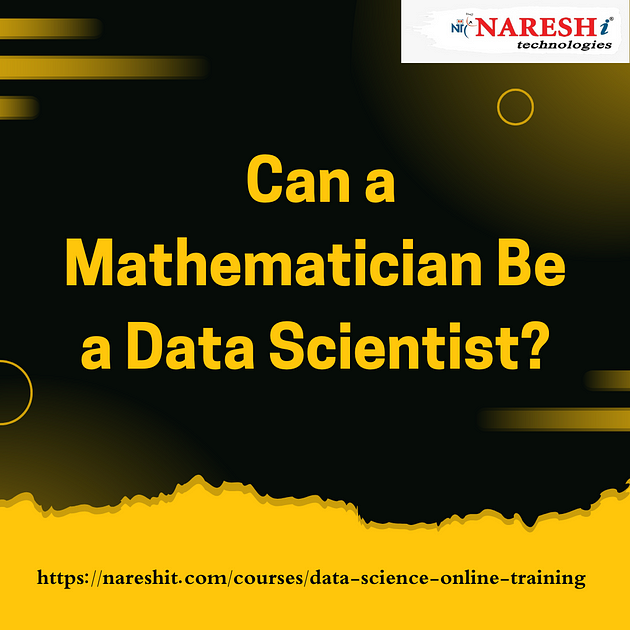Can a Mathematician Be a Data Scientist?
- Get link
- X
- Other Apps
Can a Mathematician Be a Data Scientist?
Data science is one of the coolest disciplines today-it combines mathematics, statistics, computer science, and domain expertise to extract insights from data. For mathematicians, this is exciting and almost a natural extension of their skills, as many aspects of data science match up with what mathematicians do best-from statistical modeling to algorithm development.
1. Why Mathematicians Are Great for Data Science
Mathematicians offer a set of qualities that is highly prized in data science: strong analytical thinking
Mathematicians have been trained to think the way computers do, logically and abstractly. Mathematicians are intuitive problem solvers — complex problems can be reduced to smaller, even more tractable problems. This is exactly the kind of skill needed in data science: picking out trends within data and understanding their behavior.
Statistical Knowledge: Mathematicians are well versed with statistics and probability, which form the foundation of data science. Through this ability, they are able to understand and apply statistical methods for modeling data in order to make predictions and understand results.
Quantitative Skills: Data Science is a quantitative discipline. It allows working comfortably with numbers while performing rigorous mathematical calculations through which one could make handle large datasets, develop predictive models, and assess their output.
Pattern Recognition: Maths education is known to instill a perception for patterns and interrelations, an activity necessarily undertaken in the processes of identifying trends with data.
2. Areas Where Mathematicians Stand out About Data Science
Some of the core areas of data science are as follows wherein mathematicians shine:
Machine Learning: Almost always, machine learning algorithms require calculus, linear algebra and probability theory — the last two, in particular, being areas of strength for mathematicians. Mathematicians are better equipped to understand concepts like gradient descent, Bayesian inference, and matrix operations than others who are not especially mathematically sophisticated.
Data Analysis and Statistical Modeling: the use of mathematical statistical inference from datasets. By using either design of experiments or hypothesis testing or regression modeling, mathematicians are able to understand the various trends and patterns within a dataset.
Optimization: Many data science models are optimization problems that mean that the model is trying to find the best feasible outcome to get the minimum error in predictive models. Optimization problems date from calculus and algebra which mathematicians are quite familiar with.
3. Bridging the Gap: What Mathematicians Need to Learn
Mathematicians possess all these analytical skills going into data science, but in some technical areas, they still have to develop:
Programming Skills: In case of data science, most languages applied in programming are Python, R, and SQL. Mathematicians need to acquire these skills about handling, cleaning, and conducting analyses on data efficiently.
Data Wrangling and Cleaning. Real-world data is typically messy and unstructured. One needs to learn data wrangling techniques, including how to handle missing values, normalize, and feature-engineer.
Machine Learning Frameworks. Familiarity with popular machine learning libraries like TensorFlow, PyTorch, and scikit-learn would be valuable since these frameworks allow data scientists to implement algorithms without coding every little detail from scratch.
Domain Knowledge: Knowing the industry or sector in which they were working, say finance, healthcare, or e-commerce, can help mathematicians apply data science techniques in a much more effective manner and make insights actionable.
4. Steps for Mathematicians to Transition into Data Science
Here are actionable steps for mathematicians who want to transition into data science:
Learn to Program in Python and SQL. Python has become a very popular language for data science because of its readability and number of libraries available, and SQL is a key technology in working with databases.
Study Machine Learning: You might take courses online or read books on machine learning. Focus on learning supervised and unsupervised learning algorithms like linear regression, logistic regression, decision trees, and clustering methods.
Get Practice: Work on data science projects that you can be proud to display on GitHub or otherwise in a personal portfolio. Real-world projects bridge the theory-practice gap and allow you to apply mathematical concepts toward solving data science problems.
Think About a Data Science Bootcamp: Many bootcamps offer intense training in data science, starting with data wrangling and even including machine learning. Some bootcamps also offer mentorship and job placement.
Network with Data Scientists: Join data science communities, attend webinars, and converse with professionals in the field. Networking can provide valuable insights and lead to job opportunities.
5. Future of Mathematicians in Data Science
With the increasing demand for data scientists, mathematicians find themselves to be in an excellent position for competitive success. A career in data science, aside from its intellectual stimulation, also offers good opportunities for advancement and high pay. More importantly, with the complexity of data science increasing each day, professionals who possess excellent mathematical and statistical knowledge are being demanded to develop more advanced algorithms for complex problems.
Conclusion
Mathematics provides a strong foundation to really make a mathematician a successful data scientist. However, along with the analytics and quantification skills, mathematicians would have to learn new skills in programming, machine learning, and handling large amounts of data. A mathematician can really go on to prosper well in data science with proper learning and experience, contributing highly to the growth of innovation in the field.
For mathematicians, this journey is not only possible but very rewarding, as insights generated from data drive the world today; hence, mathematics is more promising than ever.
For More Details Visit : https://nareshit.com/courses/data-science-online-training
Register For Free Demo on UpComing Batches : https://nareshit.com/new-batches
- Get link
- X
- Other Apps



Comments
Post a Comment